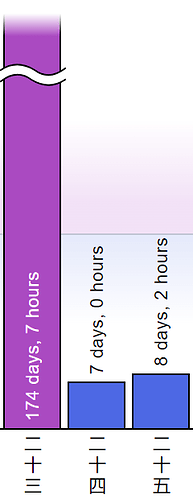Welcome to the forums, and thanks for being willing to share this with everyone!
I don’t mean this as a criticism of WK, and this is very likely an oversimplification, but in my view, WK is effectively a set of vocabulary lists (and kanji lists, sure, but the idea is similar) with memorisation ideas and a system for revision. Not everyone learns well like that, especially if that’s their main source of new word and character knowledge. If you want an example, I volunteer myself: Chinese is one of my native languages (the other being English). How were we taught in school? Initially it was mostly based on stories and passages in textbooks, but what I remember at the higher levels involved a lot more vocabulary lists containing readings, explanations and example sentences. Sound familiar? Sure, we had probably seen at least some of those words in our textbook passages, but there were just so many of them and they were getting more and more complex. If not for the fact that I couldn’t drop it as a subject, I probably would have quit studying Chinese about a year before my final exam. I also started learning French over ten years ago. Things were OK at first, but around the middle of my third year, I wanted to give up. What do I remember hating? Vocabulary lists and grammar notes listing basic meanings and usages, but not much else.
I think we can agree there’s a pattern here: in both cases, I had lessons that encouraged me to memorise new information as hard, fixed facts, and what saved me in both cases was finding books and experiences (like an immersion programme in France) that allowed me to learn using interesting material that provided context. Example sentences are helpful, sure, but they’re nothing compared to seeing how the word fits into the linguistic and logical flow of a conversation or text. I’ve now studied six languages: I’m fluent in three, close to fluent in one (Japanese, which I’m working on now), and know enough grammar to get through simple news articles related to my areas of interest in the other two, with the help of a dictionary. I think that’s decent, especially considering that the three I’m fluent in include the two I wanted to give up on (Chinese and French).
My point is this: I think you’ve done very well getting this far, and if you find that WK isn’t working for you anymore, maybe it’s time to move on, or at least to put it aside for now while you seek out a more meaningful or interesting way to study Japanese. You can always come back to it later if you want to see if there are any words you’ve missed. I think @DIO-Berry’s question is a very important one:
If you have enough grammatical knowledge for fairly complex material (i.e. longer sentences and descriptive phrases), which is around the N3 level, then maybe you can try working through things like simple news articles on your own, if that’s what interests you. If not, I think there are threads here that discuss graded readers and sites that collate native content by level. (I think one of them is called ‘Natively’?) If you happen to like anime or dramas or Japanese movies, I’d very seriously encourage you to watch more of them if you have the time. I think it’s important that you enjoy interacting with and learning Japanese, and really, even if you were a beginner with just a few textbook chapters’ worth of grammatical knowledge and vocabulary, you’d be surprised how often basic words come up. As you progress, you’ll realise you recognise more and more of what you read and hear, and that’s a good feeling in my experience. I think that finding something that gives you a taste of reaching your goal will be a good way of re-motivating yourself.
Now, the one benefit that a review system definitely provides which you can’t get on your own without a little extra effort is consistency, so you might want to continue your reviews if you feel like they’re useful, even if lessons might be best left alone for now. Regardless, I really think that what matters most right now is that you find a way to make Japanese worthwhile for you again (only if you want to continue, of course!), and based on what’s happened to me, I’d say having the experience of using your Japanese knowledge, and going through that ‘aha!’ moment when you realise what you’ve learnt is alive and makes sense, may very well help you feel like you can make it. I know such experiences helped me. 



